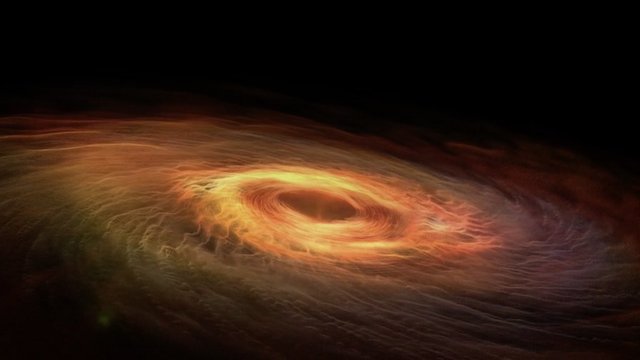
Black holes are wonderfully strange and trying to understand how they work has put many a crazy-sounding theory into the spotlight. In 2012, a group of astrophysicists concluded that black holes featured firewalls on their outer edges, potentially burning up anything that may end up caught inside it. The idea that a ring of fire, swarming with high energy particles, was at the event horizon was startling and added to the potential paradoxes scientists have proposed in relation to black holes. Now physicists found that there may be no firewalls after all. Instead, they think black holes work like growing balls of strings or “fuzzballs”.
The team from Ohio University, led by the professor of physics Dr. Samir D. Mathur, calculated what would happen if an electron fell into an average black hole, with its mass like our sun’s. Their work shows that the electron would not be likely to burn up.
“The probability of the electron hitting a photon from the radiat,” said Mathur.
Mathur’s work adds to his previous theory from 2004 that proposed black holes to be like gigantic balls yarn or “fuzzballs”. He thinks they grow as they suck in more and more objects.
The paper by the physicists uses string theory, which supposes that the universe is made of string-like tubes of energy, to discount the notion of firewalls.
“The question is ‘Where does the black hole grab you?’ We think that as a person approaches the horizon, the fuzzball surface grows to meet it before it has a chance to reach the hottest part of the radiation, and this is a crucial finding in this new physics paper that invalidates the firewall argument,” explained Mathur.
What would really happen to a person falling into a black hole? Certainly, no one knows precisely. Mathur thinks a person suffering such a fate would get “tangled up in strings” but not sure what that would look like, aiming to do more detailed calculations. Interestingly, the paper says the "infall energy" of the falling person would create new fuzzballs, and this "motion gets encoded in the evolution of these new fuzzballs."
Hi! I am a robot. I just upvoted you! I found similar content that readers might be interested in:
https://bigthink.com/paul-ratner/black-holes-are-actually-giant-fuzzballs-of-string-claims-new-research
Downvoting a post can decrease pending rewards and make it less visible. Common reasons:
Submit
Yes
Downvoting a post can decrease pending rewards and make it less visible. Common reasons:
Submit
Congratulations @yassirlag! You received a personal award!
You can view your badges on your Steem Board and compare to others on the Steem Ranking
Vote for @Steemitboard as a witness to get one more award and increased upvotes!
Downvoting a post can decrease pending rewards and make it less visible. Common reasons:
Submit